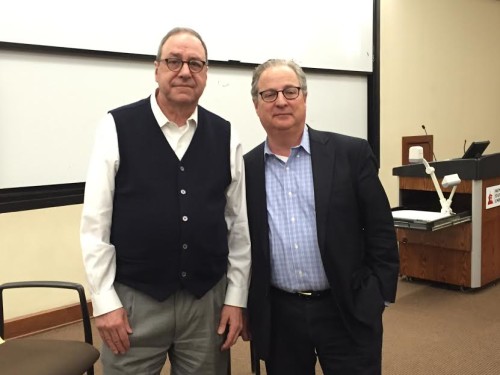
Joe Nocera (Left) and director of the School of Communication and Media Merrill Brown (right) at the colloquium series on March 23.
Photo Credit: Sean McChesney
New York Times sports business columnist Joe Nocera came to speak to Montclair State students last week, talking about his new book and his criticism that the NCAA exploits collegiate athletes.
Nocera visited on March 23 as part of the School of Communication and Media’s colloquium series. His most recent book, which he promoted during the event, is titled “Indentured: The Inside Story of the Rebellion Against the NCAA.”
“The book is about what is wrong with big-time college sports, and I do [it] through the prism of the NCAA,” explained Nocera. “It’s about how a group of people took on the NCAA, both in court and in the court of public opinion, to try and change the system to make it more equitable for players to put some money in their pocket.”
The 2007 Pulitzer Prize finalist has been writing about the NCAA in the New York Times since 2011 and has written at least 10-to-12 articles a year regarding the problems surfacing in the NCAA. Nocera and his co-author Ben Strauss worked on the book for three years before it was released in February.
The book focuses mainly on college football and men’s basketball players and how the NCAA limits athlete compensation to scholarships and cost of attendance money. Nocera feels that many collegiate athletes are brought to universities primarily to play college sports, and they should be paid for their efforts.
“My core belief is many college football and men’s basketball players are on campus to generate revenue,” said Nocera. “They are far more employee-athletes than student-athletes, and they deserve to be compensated.”
Nocera went on to say that there is something wrong with an NCAA system that makes millions of dollars each year and how the players are not rewarded for their hard work and dedication to the school’s athletic programs.
“The NCAA makes coaches, athletic directors and assistant coaches millions of dollars, and players, who are the reason they are making so much money, get nothing,” said Nocera. “I think that is wrong.”
Nocera received some criticism from readers when he started writing about the NCAA in the op-ed page of the New York Times. Nocera explained to his readers that this is more than just about sports.
“This is not a sports issue, this is a human rights issue and a civil rights issue,” said Nocera. “I think it is completely overlaid with race, and the fact that the NCAA is this powerful surprises me.”
Nocera feels that universities today are primarily focused on how successful collegiate athletes make their athletic teams, and they often forget the meaning of the term “student-athlete.”
“The universities do not keep up their end of the bargain,” said Nocera. “The universities make it nearly impossible for the students to get an education.”
Nocera told Montclair State students that there are talks of the book being turned into a movie in the future. Even though Nocera feels that a movie would have an impact, he says it he is not sure whether it would make a difference.
“There are a lot of fans who are dead-set against the idea of the players getting anything more,” said Nocera. “It is hard to say whether a book, a movie or a speech would change anyone’s minds, so I don’t have a good answer for that.”
Nocera said it is going to be interesting to witness how collegiate athletes are treated in the future if the NCAA keeps up this kind of treatment.
“What is college sports going to look like in 10 years? My guess is we are going to find out,” said Nocera.


